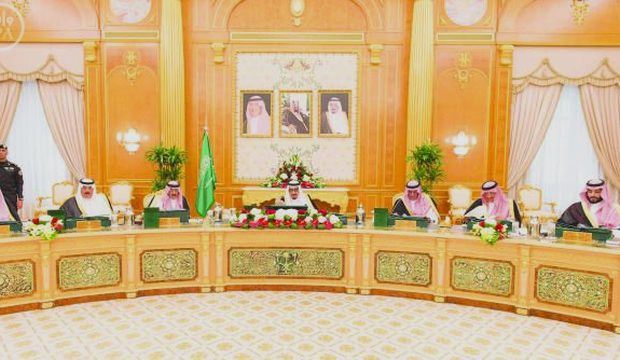
Saudi King Salman Bin Abdulaziz (C) heads a Saudi cabinet meeting in the capital Riyadh, on March 17, 2015. (Saudi Press Agency)
Riyadh and London, Asharq Al-Awsat—Saudi Arabia on Monday once again defended its judiciary and human rights record, in response to recent comments by Sweden’s foreign minister that have led to a diplomatic rift between the two nations, and warned it could reconsider aspects of its relationship with Stockholm should similar incidents occur again.
During a cabinet meeting in Riyadh on Monday, headed by Custodian of the Two Holy Mosques King Salman Bin Abdulaziz, the country’s cabinet reiterated the independence of Saudi Arabia’s judiciary, which they said ceded to no other higher authority except that of the Islamic Shari’a, on which Saudi law is based.
The ministers said this fully protected the individual rights of all Saudi citizens within the boundaries set by the Shari’a, which is based on the twin principles of mercy and justice.
They added that Saudi law fully protected citizens’ rights to freedom of expression and opinion, provided once again this was expressed within the context of the Shari’a.
This comes as the Kingdom recalled its ambassador to Sweden on Wednesday in response to recent comments made by Swedish Foreign Minister Margot Wallström in the Swedish parliament, in which she criticized Saudi Arabia’s human rights record, its judiciary, and a number of other issues.
Saudi Arabia responded strongly to the comments last week, which it said “amounted to interference in the internal affairs of the Kingdom, in violation of international covenants and diplomatic conventions.”
The Saudi cabinet renewed these criticisms during Monday’s session, saying the comments criticizing the Kingdom’s judiciary, its laws and cultural norms went against some of the basic principles on which the international community was founded.
Such principles, they said, called for respect of different cultures and practices around the world and non-interference in other states’, especially friendly states, affairs.
They added that Saudi Arabia had the right to uphold its Arab and Islamic character without being vilified by another country, which in this case had taken issues out of their correct context.
As Saudi law is based on the Islamic Shari’a, the ministers said, any criticisms leveled at it essentially denigrated a system espoused by over 1 billion Muslims around the world.
In light of this, the foreign minister’s comments were inappropriate and insensitive, and a matter of this weight should not therefore be used to score political points, whether domestically or internationally, they said.
Speaking to Asharq Al-Awsat, a Saudi diplomatic source, who requested anonymity, also echoed the cabinet’s view of Wallström’s comments, which he said were “unacceptable” within a diplomatic context.
He said the comments had more to do with internal political point-scoring between Wallström’s ruling Social Democrats and other parties in Sweden—especially with elections looming in the country—than with a genuine concern for human rights in the Kingdom.
“Human rights organizations regularly put pressure on Western governments. Some of them keep quiet but then some MPs or government officials take up the call during the periods before elections in order to achieve internal political gains that have nothing to do with an actual concern for human rights,” the source said.
Some of Wallström’s comments also made specific mention of women’s rights in the Kingdom, suggesting women did not have equal status to men in the country, something the ministers denied.
The ministers said such allegations were baseless since Saudi women had achieved a number of successes in the past years while being able to maintain their Arab and Islamic identities.
These include women gaining several top leadership positions within both the private and public sectors in Saudi Arabia and securing a proportion of seats in the country’s Shura Council, or Consultative Assembly, rivaling that of many other corresponding bodies in other countries around the world.
The cabinet concluded by saying it hoped no further similar incidents would take place and warned it would be forced to reexamine several facets of its relationship with Sweden should it see a repeat of the recent incident which sparked the rift.
Observers say the expected response from numerous Arab and Islamic countries to the foreign ministers’ comments—one of which already saw Arab League members withdraw an invitation to Wallström to speak as a guest of honor at the organization earlier this month—will place Stockholm in an embarrassing position.
They expect the minister to withdraw the comments as a result due to the strong Saudi response and the warning from Riyadh that it could reassess certain aspects of its relationship with Stockholm.
Adhwan Alahmari contributed additional reporting from London.
